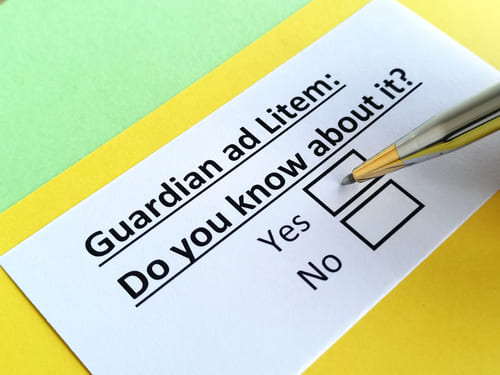Recent Blog Posts
Can I Change My Child’s Guardian Ad Litem in Illinois?
 Whenever a legal proceeding involves a child, such as a divorce or child custody case, a court can appoint a guardian ad litem. A guardian ad litem (GAL), which is Latin for “a guardian for the lawsuit,” is a person who advocates for a child’s interests in any court proceeding that involves an underage or mentally incompetent child. In Illinois, GALs are attorneys who have gone through extra training.
Whenever a legal proceeding involves a child, such as a divorce or child custody case, a court can appoint a guardian ad litem. A guardian ad litem (GAL), which is Latin for “a guardian for the lawsuit,” is a person who advocates for a child’s interests in any court proceeding that involves an underage or mentally incompetent child. In Illinois, GALs are attorneys who have gone through extra training.
If you have questions about appointing a GAL for your child, it is best to consult with a family law attorney who can advise you.
This article will discuss what a GAL does, when one is appointed, and whether you can change your child’s GAL.
What Does a GAL Do?
A GAL’s job is to make sure the child’s interests are protected during court proceedings. Once appointed, the GAL will usually launch an investigation into the child’s history, needs, living environment, relatives, and other life elements. By Illinois law, a GAL must do the following:
Can I Adopt a Child I Am Related to in Illinois?
 It is an incredibly difficult decision for someone to relinquish their parental rights. This conclusion is generally by people for whom life has been too tough to function as parents are expected to. Perhaps the parents are dealing with severe mental or emotional conditions or battling a substance addiction, and they are unable to give their child a suitable home regardless of how much they love them. In some cases, a relative of the parents may want to adopt the child. This can often be the best option for the child, although it can be a complex process for the people who wish to adopt them. If you are considering related adoption of a family member’s child, speak with an experienced Cook County, IL adoption lawyer who can review the case and explain the types of complications you might expect to face.
It is an incredibly difficult decision for someone to relinquish their parental rights. This conclusion is generally by people for whom life has been too tough to function as parents are expected to. Perhaps the parents are dealing with severe mental or emotional conditions or battling a substance addiction, and they are unable to give their child a suitable home regardless of how much they love them. In some cases, a relative of the parents may want to adopt the child. This can often be the best option for the child, although it can be a complex process for the people who wish to adopt them. If you are considering related adoption of a family member’s child, speak with an experienced Cook County, IL adoption lawyer who can review the case and explain the types of complications you might expect to face.
How Does Related Adoption Work?
Related adoption happens when someone related by blood or marriage to a child adopts them. The adopted parents can be aunts and uncles, step-parents, siblings, or grandparents, among others.
How Can Social Media Affect My Illinois Divorce?
 In 2024, the Internet is simply a fact of life. As it has spread through every facet of modern society, people without smartphones have a difficult time staying on top of updates ranging from developments at their work, changes at their child’s school, their medical appointments, and even which groceries will be on sale on any given day. Social media networks are a crucial part of many people's daily routines and are used for everything from wishing a happy birthday to beloved relatives, receiving payments, and even finding dates.
In 2024, the Internet is simply a fact of life. As it has spread through every facet of modern society, people without smartphones have a difficult time staying on top of updates ranging from developments at their work, changes at their child’s school, their medical appointments, and even which groceries will be on sale on any given day. Social media networks are a crucial part of many people's daily routines and are used for everything from wishing a happy birthday to beloved relatives, receiving payments, and even finding dates.
With all the advantages that increased access to social media has presented, there are also more challenges, particularly regarding individuals’ privacy. Where in the past a person might have simply needed to call in sick to work, nowadays, they need to make sure there is nothing online that might indicate to their boss that it was not illness keeping them out of the office. Like in other aspects of life, social media has been playing an increasingly influential role in divorce proceedings in recent years. If you are considering divorce and are concerned about how your social media presence might affect it, a Chicago, IL divorce lawyer can review your online posts and interactions and guide you on any modifications that might be advisable.
What Happens to Child Support Payments if I Lose My Job?
 When you first arranged your divorce settlement, there were so many things that you and your ex needed to work out: Where would your children live? How often would each of you see them? Will either pay the other alimony? Who can make important decisions on your child’s behalf? How much child support will you need to pay? What are you supposed to do if things in your life have changed from the way they were back then? If for example, you make monthly child support payments to your ex and now you are unemployed, are you expected to keep making those payments somehow? For answers to these and more questions, you can speak with a Skokie, IL divorce settlement lawyer.
When you first arranged your divorce settlement, there were so many things that you and your ex needed to work out: Where would your children live? How often would each of you see them? Will either pay the other alimony? Who can make important decisions on your child’s behalf? How much child support will you need to pay? What are you supposed to do if things in your life have changed from the way they were back then? If for example, you make monthly child support payments to your ex and now you are unemployed, are you expected to keep making those payments somehow? For answers to these and more questions, you can speak with a Skokie, IL divorce settlement lawyer.
Can I Be Granted a Child Support Modification in Illinois?
Under certain circumstances, it is legally acceptable to modify aspects of a divorce decree, including those that refer to child support payments. For example, if the paying spouse has unexpectedly and involuntarily experienced a loss of income, whether the income has stopped altogether or decreased significantly, this would be considered a reasonable case for someone to seek a divorce decree modification. If you quit your job, this would not be considered unexpected or involuntary. If you have chosen to leave your job and thus lose your income as a result, this is not considered appropriate grounds for seeking a modification.
Same-Sex Divorce in Illinois
 Same-sex divorce may seem like a relatively new legal topic since same-sex marriage was only legalized in the past decade in many states. In fact, it was legalized about ten years ago in Illinois, effective as of June 1, 2014. Although same-sex divorce is not very different from divorce for a straight couple, what happens when a same-sex marriage ends is extremely different from what used to happen in the past. Before same-sex marriage was legal, a spouse would not legally inherit their deceased spouse’s estate, and instead, it would be liquidated and divided among any blood relations. And if a couple no longer wished to be together, if one spouse was the breadwinner and the other was the homemaker, the one who took care of all the household responsibilities would be left without any financial backing. If you have questions about same-sex divorce in Illinois, an experienced Cook County, IL divorce attorney has answers.
Same-sex divorce may seem like a relatively new legal topic since same-sex marriage was only legalized in the past decade in many states. In fact, it was legalized about ten years ago in Illinois, effective as of June 1, 2014. Although same-sex divorce is not very different from divorce for a straight couple, what happens when a same-sex marriage ends is extremely different from what used to happen in the past. Before same-sex marriage was legal, a spouse would not legally inherit their deceased spouse’s estate, and instead, it would be liquidated and divided among any blood relations. And if a couple no longer wished to be together, if one spouse was the breadwinner and the other was the homemaker, the one who took care of all the household responsibilities would be left without any financial backing. If you have questions about same-sex divorce in Illinois, an experienced Cook County, IL divorce attorney has answers.
Will I Be Stuck Paying For My Ex’s Debt in an Illinois Divorce?
 There are many reasons why divorce can be a complicated process. Some couples have an especially acrimonious split and the path toward drafting their divorce settlement is full of spite and anger. Every decision brings a fresh round of arguments. Some couples decide to get divorced because they were not compatible as a couple but they might still care for and appreciate each other. Even so, the emotions and disappointment they might feel can make the process unpleasant.
There are many reasons why divorce can be a complicated process. Some couples have an especially acrimonious split and the path toward drafting their divorce settlement is full of spite and anger. Every decision brings a fresh round of arguments. Some couples decide to get divorced because they were not compatible as a couple but they might still care for and appreciate each other. Even so, the emotions and disappointment they might feel can make the process unpleasant.
The specific matters that need to be settled in a divorce can also make it difficult. Spouses need to agree on several issues like who will stay in the family home, what will happen with their life insurance policies and retirement funds, and what sort of spousal support arrangement they will have. One of the more complicated issues that need to be settled in a divorce is what will happen with debt. There is no one way to settle this that can apply to all couples because everyone’s circumstances are different. If you are headed toward divorce but are worried you will end up being responsible for your ex’s debt, a knowledgeable Cook County, IL debt distribution attorney can help shed light on this topic.
Should I Consider Mediation for My Illinois Divorce?
 No two people are the same. And therefore, no two marriages are the same and no two divorces are the same. Different arrangements work for different people. Some feel so hurt and offended by their soon-to-be ex-spouse that there is no option other than a contentious divorce in court. Others recognize that they do not make sense as a married couple but still appreciate each other and, if they have children, would like for their child to feel safe and secure in either parent’s home.
No two people are the same. And therefore, no two marriages are the same and no two divorces are the same. Different arrangements work for different people. Some feel so hurt and offended by their soon-to-be ex-spouse that there is no option other than a contentious divorce in court. Others recognize that they do not make sense as a married couple but still appreciate each other and, if they have children, would like for their child to feel safe and secure in either parent’s home.
If the second category sounds more like you and your spouse, mediation might be a good choice for you. It is generally much quicker and less expensive than the alternative. If you and your spouse are considering divorce but neither of you wants to fight it out in court, a knowledgeable Chicago, IL divorce lawyer can guide you through this decision.
Reasons DCFS May Take Your Children
 Your children’s welfare is a paramount concern to the state of Illinois. Things like physical violence, neglect, or inadequate care are only some reasons that the Department of Child Protective Services (DCFS) may choose to take your child from their home. When under investigation by DCFS, do not hesitate to contact a DCFS investigations attorney to help safeguard your rights and keep your children with you where they belong.
Your children’s welfare is a paramount concern to the state of Illinois. Things like physical violence, neglect, or inadequate care are only some reasons that the Department of Child Protective Services (DCFS) may choose to take your child from their home. When under investigation by DCFS, do not hesitate to contact a DCFS investigations attorney to help safeguard your rights and keep your children with you where they belong.
When DCFS Comes For Your Children
A DCFS caseworker with an authorized court order is allowed to remove your child or children from the home. An emergency removal is also possible if the caseworker believes there is a reason that such an emergency warrants one.
DCFS caseworkers must have a reasonable cause for removing a child from a home without an authorized court order. A reasonable cause would be one of the following:
Why Establishing Paternity is Good For Both Parents
 Illinois law does not automatically acknowledge a child’s biological father as the legal father if a child’s parents are not wed. Instead, fathers looking to be acknowledged as the legal father of their children will need to establish paternity. Establishing paternity can protect a father’s rights to his children and provide either parent with the financial support he or she may need. An attorney can go over the finer points of how to establish paternity for your family.
Illinois law does not automatically acknowledge a child’s biological father as the legal father if a child’s parents are not wed. Instead, fathers looking to be acknowledged as the legal father of their children will need to establish paternity. Establishing paternity can protect a father’s rights to his children and provide either parent with the financial support he or she may need. An attorney can go over the finer points of how to establish paternity for your family.
The Benefits of Establishing Paternity
Establishing paternity has many benefits for parents wanting to create and maintain a parent-child bond. Establishing paternity may involve the following for the father:
-
A legal relationship between the father and child
-
Allows the father to take trips and travel with their child
Why A Legal Separation Might Be Better Than Divorce
 There are potential advantages to choosing a legal separation over a divorce, most of which are financial and could be a good reason to remain legally married. Whether you prefer a legal separation or something more permanent like divorce, a skilled and experienced attorney can provide the advice and resources needed to navigate the legalities of the entire process.
There are potential advantages to choosing a legal separation over a divorce, most of which are financial and could be a good reason to remain legally married. Whether you prefer a legal separation or something more permanent like divorce, a skilled and experienced attorney can provide the advice and resources needed to navigate the legalities of the entire process.
What is the Difference Between a Legal Separation and a Divorce?
The primary and only relevant difference between the two is that in a legal separation, you are still considered married. Most important legal issues, such as child support and marital property division, are still addressed before a separation is finalized.

 312-984-1514
312-984-1514

